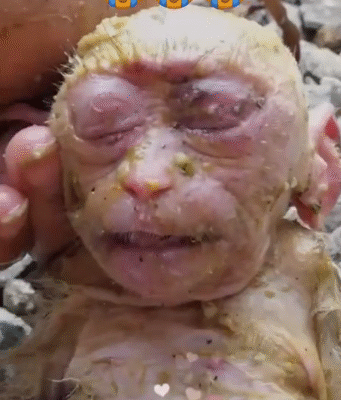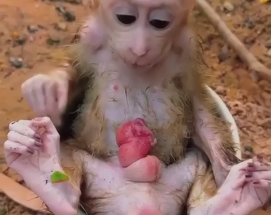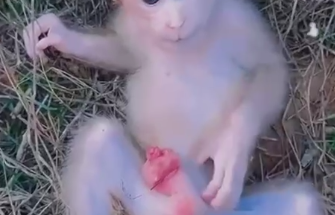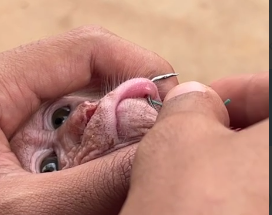“There’s a baby monkey,” the voice whispered. “Someone’s hurting it. It’s bad. Please help.”
Trillian didn’t ask questions. She just grabbed her gear, jumped into the rescue jeep, and raced through the muddy backroads, her knuckles white on the steering wheel. She’d heard these calls before. They always shook her, but something in the tone of the voice made her feel this one was different.
She arrived at a weather-worn shack outside a village. The yard was scattered with trash, metal scraps, and broken bottles. And there, under a crooked wooden beam, barely visible in the shadow, was a small figure.
He wasn’t tied up. He was too broken to even move.
A baby monkey—just a few months old. His whole body told a story of pain. Clumps of fur were missing. Angry red wounds covered his limbs and back. There were bruises, cigarette burns, and swelling around one eye. His tail was limp, twisted unnaturally. One of his tiny hands was scraped raw, the nails chipped, blood dried in patches.
But worse than the wounds was the silence. He didn’t cry. He didn’t flinch. He just stared, dazed and dull-eyed, as if he’d already left the world long ago.
Trillian knelt beside him, her breath catching in her throat.
“Hey, little one,” she whispered. “I’ve got you now.”
She lifted him gently, wrapping him in a clean towel. His body was frighteningly light, his bones sharp beneath his matted fur. He didn’t resist. He couldn’t.
She carried him as if he were glass.
Back at the sanctuary, the staff gathered in stunned silence. They had seen many cases—wild animals injured by traps, sick from disease, orphaned by hunters. But this was different.
This was human cruelty, deliberate and intimate.
The vet team got to work immediately. Fluids. Painkillers. Warmth. The baby was dehydrated, anemic, and in shock. He had bruised ribs and a fractured tail. One eye was cloudy from repeated trauma. His wounds showed signs of repeated abuse—some old, some fresh. They shaved parts of his fur to treat the infections. His skin, raw and sore, peeled in some areas from burns and friction.
“What kind of person could do this?” one staff member whispered.
No one answered.
Trillian stayed by his side, refusing to leave the clinic overnight. She gave him a name: Miko, which means “tiny strength” in a language she once learned from an elder in a nearby village.
And strength, somehow, Miko had.
The first week was critical. Miko was too weak to eat on his own. He was fed through a syringe, drop by drop. His body shook with fever. Sometimes he would whimper softly in his sleep—sounds that pierced straight through the heart.
But slowly, he began to respond.
He made eye contact. He gripped a finger. He blinked at the sound of Trillian’s voice.
Trillian talked to him constantly, her tone always calm, always gentle.
“You’re safe now, Miko. No one will ever hurt you again.”
The days turned into weeks. His wounds began to close. New fur grew in like soft moss on healing earth. His appetite improved. He began to lift his head, then crawl, then sit upright. He’d watch Trillian with curious, cautious eyes, sometimes reaching out to touch her arm, just to make sure she was real.
But trauma isn’t only skin deep.
Miko was terrified of loud noises. If a man entered the room, he would freeze or scramble to hide. He hated sticks. He panicked when anyone reached down too quickly. And he never, ever played.
While other young monkeys in the rescue center chased each other and leaped across the enclosure, Miko stayed at the edge—watching, withdrawn, his one good eye always scanning for danger.
Trillian didn’t push him. She knew healing took time, and trust could not be rushed. So, she gave him space. And love. And patience.
She placed a soft stuffed monkey in his enclosure for comfort. She read to him during stormy nights. She hummed lullabies when he curled up into the hammock alone.
Bit by bit, Miko began to open up.
He followed Trillian from one side of the enclosure to the other. He chirped softly when she arrived. He allowed her to carry him on her shoulder.
And one bright morning, he played.
Just a little. A gentle tug on another monkey’s tail. A quick hop, then a retreat. But it was enough to make Trillian cry quietly behind her sunglasses.
Months passed.
Miko grew stronger, more confident. His wounds became scars, his silence turned into soft chatter. He bonded closely with another young rescue—Luma, a baby female monkey who had lost her mother to poachers. Together, they clung to each other like survivors of the same storm.
The team made a decision: Miko would not be returned to the wild. Not yet, and maybe not ever. His trauma ran too deep. His eye was permanently damaged. But he had a place at the sanctuary—a safe, spacious environment with trees to climb, companions to play with, and humans who respected his journey.
And he had Trillian.
Epilogue
Through camera footage, community reports, and pressure from animal protection groups, the man who had hurt Miko was eventually identified and charged with animal cruelty. It wouldn’t undo the suffering, but it sent a message: this kind of violence would not go ignored.
Miko’s story spread.
Photos of his rescue went viral. Donations poured into the sanctuary. Schools taught lessons on compassion, using Miko as an example. Artists painted murals. Children sent hand-written letters saying, “We love you, Miko.”
But Miko didn’t need the spotlight.
All he needed was what he had now: freedom from pain. Freedom to heal. A second chance.
Every time Trillian looked at him, playing quietly in the sun-dappled trees, she felt the same surge of quiet pride.
She had answered a call that day.
But it was Miko who taught the world what it means to survive.



